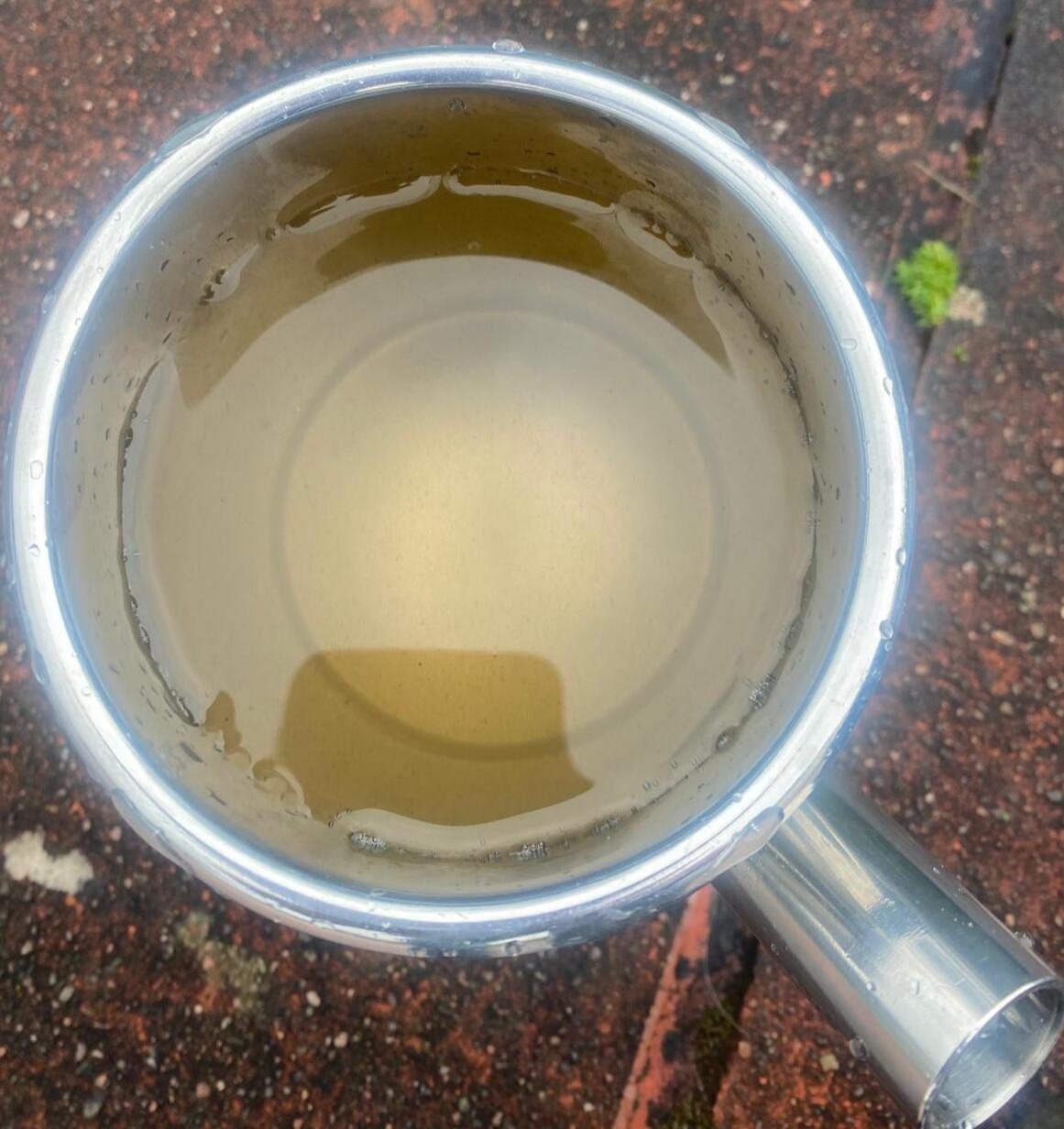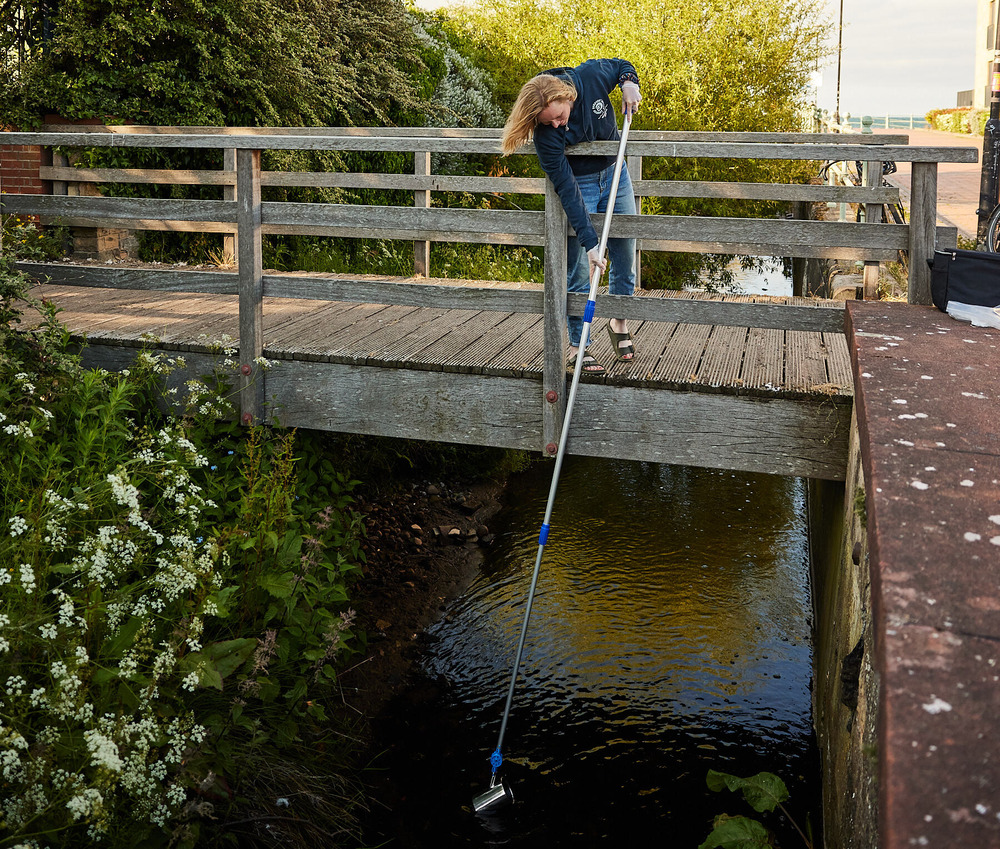Privatise, nationalise, or social enterprise? Is a purpose-led ownership model the way to fix the UK’s water company crisis?
ANALYSIS: Scotland’s publicly owned water company is filling the country’s water with raw sewage just as fast as England’s privatised system — is social enterprise the answer?
The water smells worse than it looks, says Charlie Allanson-Oddy. That really is saying something, because the sickly, brown-yellow liquid looks exactly like you’d expect water with raw sewage in it to look.
The water (pictured) has just been scooped out of the Figgate Burn, a stream which meets the sea in Portobello, a seaside community on the outskirts of Edinburgh. Allanson-Oddy will now send the sample off to a lab to test for the presence of e coli and other indicators of raw sewage.

Allanson-Oddy is doing this testing for Porty Water Collective, a voluntary group I’m also a member of. We’ve tested the water at the point where the Figgate Burn joins the Firth of Forth on 21 of the weeks since 7 June 2023. On 19 of those weeks our testing found high levels of sewage pollution.
The sandy beach at Portobello is backed by a promenade lined with fish and chip shops, cafes and ice cream vans. Easily reachable from the rest of Edinburgh, it is a popular public space. Even during the winter there are brave swimmers in the sea on a daily basis. Kids regularly play in and around the Figgate Burn. It goes without saying that the stream, and the sea at Portobello, should not be full of raw sewage.
This isn’t just a problem in Portobello, or even just in Scotland. The UK’s waters are full of sewage. The water infrastructure across the country isn’t fit for purpose and is frequently overwhelmed. Storm overflows, which are designed to release raw sewage into rivers and the sea in exceptional circumstances, are routinely used by water companies to ease pressure on the system. Environmental regulators have suffered severe budget cuts, meaning that even reported pollution events go un-investigated and unpunished.
The debate playing out in public and the media often focuses on what the ownership model of the water companies should be. But that debate is very much framed as “private sector vs public sector”, which begs the question — what if the UK’s water companies were social enterprises?
Please don’t do that to our water
Campaign group Surfers Against Sewage’s 2023 Water Quality Report says over the previous five years, untreated sewage was released 58,304 times in Scotland, for 604,643 hours in total. But, because over that period just 161 of Scotland’s 3,641 sewage overflows are monitored (4%), Surfers Against Sewage estimates the real number of discharges is likely to be in the hundreds of thousands.
Scotland’s water and sewage services are nationalised. Scottish Water is the company responsible for delivering the services (and for discharging the vast amounts of sewage into the water) and the Scottish Environment Protection Agency (SEPA) is responsible for regulating Scottish Water’s environmental performance.

Porty Water Collective volunteer Eslpeth Simpson collects water from the Figgate Burn in Portobello, Edinburgh (source: Mike Guest)
Allanson-Oddy says that despite the nationalised ownership model, in his years of campaigning with both Surfers Against Sewage and Porty Water Collective he’s repeatedly faced similar push-back to that received by campaigners in the rest of the UK – that there’s not enough funding to fix the problem.
“Scotland owns its own water company. But with Surfers Against Sewage and Porty Water Collective we feel there’s a disconnect in being told that ‘this is your water’, then when we say ‘well, please don’t do that to our water’ and they say ‘but it's difficult, it's expensive’. So it's still coming back to this money-based argument,” he says.
“I’ve spoken with SEPA staff, who are all super-friendly, super-helpful and undoubtedly go into work in that field because they genuinely care about protecting our environment. However, I believe they are hamstrung and unable to put real pressure on Scottish Water.”
Increased bills, increased sewage discharges
If you’re shocked by Scotland’s nationalised water company discharging hundreds of thousands of hours worth of faeces into its waterways, the news from south of the border is even worse. Data released by the UK government’s Environment Agency in March said there were 4m hours of raw sewage discharges in England in 2023.
Meanwhile, England’s privatised water companies are failing. Thames Water is currently the most high profile example. The Guardian reported last week that government departments are drawing up plans to nationalise the firm, with most of the firm’s £15.6bn debt added to the public purse and some lenders losing as much as 40% of their money.
Thames Water’s crisis is being held up as representative of the failure and excesses of England’s privatised system. Debate rages across the English media as to whether Thames Water should be nationalised, with more companies expected to be in the same state of emergency soon. A YouGov poll in June 2023 found 69% of Brits are in favour of nationalisation.
But given Scotland’s waters are just as full of sewage as England’s are, perhaps nationalisation isn’t the answer. That significantly more people voted for “don’t know” (23%) than the private sector option (8%) in YouGov’s poll demonstrates a potential appetite for alternative solutions.
Can social enterprise offer a way forward? And how far are we from politicians, the media and the public changing that “don’t know” into a call for purpose-led public utilities?
What is the purpose of water companies?
The justification for privatisation of England’s water companies was successive governments failing to sufficiently invest in infrastructure. Clearly that privatisation has failed, but water companies as independent social enterprises could be led by industry experts rather than ministers, pursuing social and environmental purpose without political concerns.
The risk of organisations with a significant environmental impact, like Scottish Water, being led by politicians was demonstrated last week when the Scottish government announced it has scrapped its legally binding commitment to reduce carbon emissions by 75% by 2030. It’s hard to envisage Scottish Water prioritising improving its environmental impact when the government clearly isn’t.

Dan Gregory (pictured), associate director of Social Enterprise UK, believes social enterprises would have the ability to invest profits to improve infrastructure and services for the long-term benefit of people and planet, rather than shareholders, while also having the freedom to be more flexible than the public sector, piloting new approaches and innovations.
Gregory says: “There are countless examples of social enterprises delivering brilliant public services and utilities, from health and care in the UK, to energy and housing in Denmark, Austria and New Zealand, for example. These responsible business models promise the best of both worlds, beyond the binary of privatising versus nationalising. Of course, sustainable public services and utilities still need proper investment and appropriate regulation.”
Better business or half measures?
In July 2019 Anglian Water changed its articles of association to embed public interest. The change committed the firm to considering its social and environmental impact at the same time as delivering a return for shareholders.
Anglian Water is also supporting the Better Business Act, a campaign calling for legislation to require every medium and large company in the UK to align their activity with the interests of wider society and the environment.
- Read more: Better Business Act campaigners urge UK parliament to halt relentless pursuit of shareholder profits
But despite these public commitments to positive impact, Anglian Water is facing similar challenges to that of England’s other water companies. The Environment Agency’s 2023 data showed the company discharged sewage 31,632 times that year, up from 16,082 incidents the previous year. In July 2023 the BBC reported Anglian Water had £6.6bn of debt.

Philip Kirkpatrick (pictured), charity & social enterprise lawyer, partner at Bates Wells, credits Anglian Water for embedding social purpose and says the value of doing so has to be judged in the long term. But he notes that without any powerful accountability mechanism, Anglian’s delivery of its social purpose depends on the culture of the company and the will of its shareholders.
Kirkpatrick says: “The purpose provisions in their articles are not entrenched and can be changed at any time by a 75% majority. Furthermore, the directors’ duties to run a socially responsible business are only enforceable by the shareholders removing them from office.”
Anglian Water could introduce tougher constitutional mechanisms, says Kirkpatrick, for example by admitting socially focused members and entrenching the purpose by requiring their consent to any change. There could also be entrenched restrictions on dividend payments in defined circumstances.
Kirkpatrick says it would be possible to go further than Anglian Water and establish a water utility company as either a charity or a community interest company if the members of the company were willing to accept the permanent restrictions on financial returns entailed by such status.
But he questions whether doing so is the best way to create positive social and environmental impact. He says: “I expect that greater impact could be achieved if legislation required the delivery of social outcomes and set reasonable restrictions on payment of dividends (such as requiring adequate investment to overcome sewage spillage before dividends are paid), and the remit of Ofwat [the water services regulator in England and Wales] was changed to include enforcement of those requirements. Of course, the impact of such changes on the willingness of private equity to invest would need to be considered.”
Social enterprise isn’t a magic wand

Andrew O’Brien (pictured), director of policy and impact at cross-party think tank Demos, says making the UK’s water companies social enterprises, supported by state coordination and financing, would enable the firms to clear up the mess they’ve made.
In the last six months O’Brien and Demos have published reports on both legislating for all UK businesses to be social enterprises and the country’s water infrastructure challenges. Although O’Brien believes the water companies should be social enterprises, he emphasises that simply changing the ownership model of the firms isn’t a “magic wand”.
- Read more: Legislating for all businesses to be purpose-led will boost UK economy, argues think tank
Given the huge amount of investment required to fix the UK’s water infrastructure and mountains of debt the companies have stacked up, O’Brien believes making the firms social enterprises immediately wouldn’t be a fair starting point. He says a government wanting to make the reform would need to support refinancing the company’s debt to create a longer term pathway towards repayment.
O’Brien says: “The social enterprise business model requires patience and a long-term approach to value creation. If you try to insert that overnight into a business environment which is governed by short-term debt financing and financial considerations, it will probably be setting it up to fail.”
The government would need to urgently work with the companies so that over the next five to 10 years the necessary infrastructure and operational upgrades were made, says O’Brien. Beyond this initial effort to create a level playing field, the government would need to create a regulatory framework and “coordinating infrastructure” to ensure all relevant stakeholders are engaged in the process.
To enable the social enterprise water companies to access finance, O’Brien suggests creating a body similar to the Public Works Loan Board, which local authorities can borrow from. The new body would be overseen by the public sector and ensure the water companies can access lower cost sustainable finance.
Can things really get any better?
So, certainly not a quick or easy fix, but one O’Brien firmly believes is not only preferable, but possible. He trusts his preferred public participation governance model to bring people together to make difficult decisions collectively (for example in the case of increasing bills to deliver positive social or environmental outcomes). He also believes the public would tolerate higher bills if they were demonstrably going towards societal or environmental benefit, rather than paid to shareholders.
O’Brien says: “We've done nationalisation and we’ve done privatisation, and a certain fatalism starts to emerge in the conversation where people ask ‘can things really get any better? Are all the options bad options?’
“We need to show how [a social enterprise model] would be much better, but we also need to hold the government and the market’s feet to the fire and say ‘you would also have to change the way you operate to make this work effectively.’ But I think we can do that.”
Top image: Porty Water Collective volunteer Charlie Allanson-Oddy at a demonstration (source: Joe Seal)
Thanks for reading our stories. As an entrepreneur or investor yourself, you'll know that producing quality work doesn't come free. We rely on our subscribers to sustain our journalism – so if you think it's worth having an independent, specialist media platform that covers social enterprise stories, please consider subscribing. You'll also be buying social: Pioneers Post is a social enterprise itself, reinvesting all our profits into helping you do good business, better.



